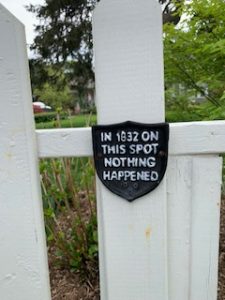
What is called our experience is almost entirely determined by our habits of attention. William James
Some towns are very conscious of their history, and are keen to let a visitor know of important events that happened there. Niagara on the Lake is one of these places. We do enjoy that, history can be interesting. But this sign posted there made me laugh, because when I was younger, I often did feel that “nothing happened” where I lived.
One day, bemoaning a case of writer’s block, I voiced this sentiment out loud to my younger sister. She chided me, saying “just look around you!”
If I stop hurrying, and observe life, it does reveal its treasure. For example, there is such a variety of plants and flowers and insects and birds. There are over 25,000 different species of orchids, over 300,000 species of beetles. We just need to use our senses to awake to all of this teeming life we are imbedded in.
In spring we can take in colour and the perfume of flowers, the touch of the wind on our skin, the warmth of the sun on our face. Like the poet William Wordsworth, we save these images up on our mind (and in this day and age, on our phones).  Every day our brain processes about 70,000 thoughts, a whole internal world alive and responsive to the life around us. There is so much beauty that even the poorest of us has ample opportunity to appreciate it.
Every day our brain processes about 70,000 thoughts, a whole internal world alive and responsive to the life around us. There is so much beauty that even the poorest of us has ample opportunity to appreciate it.
Then there’s the amazing life force of each person. We all belong to humanity and yet at the same time each of us is unique. Even identical twins experience life as individuals. Our lives and environment mold us, etching stories on our faces. The funeral eulogy reveals aspects of a person’s life that would have been so interesting to discuss with them. A woman in my online Bible study noted that the people in our lives can be “blessings or lessons.” We were meant to interact with nature, we are meant to interact with people. We need and support each other in turn, appreciate and share the gifts we’ve been blessed with.
In his book Wisdom of the Ages, Wayne Dyer advises us to pretend to ourselves that this is both the first and the last time we are having an experience; it helps to give us a fresh eye and a sense of enthusiasm for whatever we are doing.
And when we do this, there is nothing or no-one ordinary, and there is nowhere nothing happens.